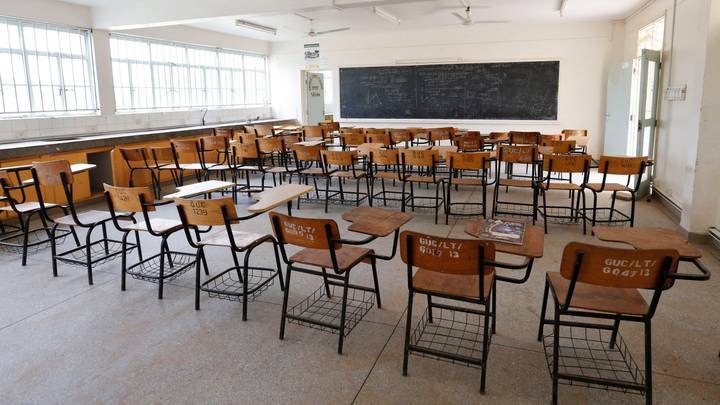Rafetison Olivia Nirinavalona started teaching in a school for underprivileged children when most girls her age would probably be more worried about the travails of teenage life than social inequity.
"I was 17 when I realised my childhood dream," Olivia, now 28, tells TRT Afrika.
"Even at that age, happiness for me meant sharing the light of learning with kids in a village school 74km from the Madagascan capital of Antananarivo."
As an educator driven by a passion to give the children of her community opportunities to secure their future through education, Olivia's commitment to the cause has remained unwavering in the 11 years since she chose that path.
When she isn't teaching in a classroom, the young woman can be found among children in orphanages, remote villages and underserved areas, where her enthusiasm for learning rubs off on her wards.
Olivia's mission centres on a fundamental goal: to instill in kids a love of reading.
In 2014, she joined Teach for Madagascar, a nonprofit dedicated to improving the quality of education in Madagascar, a country with a population of approximately 31 million and a literacy rate of just over 30%.
Through the LET'S READ project, Olivia plays a crucial role in engaging children who would otherwise miss out on the opportunity to receive an education due to reasons ranging from financial insecurity to societal gaps.
The project, now in its fourth year, is close to her heart not only for her belief in the power of the written word but also for its success in promoting literacy.
LET'S READ primarily aims to promote the reading habit among children in Madagascar. To do this, we published children's storybooks (Diary Nofy) in two editions in 2021 and 2023. Eleven of our stories have made the grade in nationwide writing competitions," Olivia tells TRT Afrika.

So far, nearly 50,000 books have been printed in Malagasy, French and English along with audio and Braille versions of these publications.
These learning resources have been distributed to public primary schools, institutions for children with visual impairments, and orphanages across Madagascar.
Reading as therapy
Olivia sees books as more than just a source of knowledge and a means to spark one's imagination.
"I have loved reading for as long as I can remember. I would pick books from my father's library and devour them. There was a period when I was bullied at school and I didn't have friends. The school library became my refuge. That's where I discovered the treasures of reading," she recalls.
In her interactions with children, Olivia uses her experience of reading as a therapeutic exercise to stoke interest that ultimately leads to intellectual engagement.
"What fascinates me about reading is the possibility of escaping into a different world or another dimension. It's a way of enriching my imagination while broadening my knowledge," she explains.
For Olivia and her fellow volunteers in the LET'S READ programme, teaching children to read and write is about safeguarding a fundamental right, as outlined in the United Nations Convention on the Rights of the Child.
During fieldwork, volunteers are often shocked at the vulnerability and poverty many children face.
"It's difficult to process that these children have no access to imagination, or even to the possibility of dreaming. This limits them enormously," says Olivia.
"Fortunately, we have books. Diary Nofy means 'dream diary', or a window to imagine a better future. We want to show children that reading can be fun and that it broadens their horizons."
Widening outreach
Creating, printing, translating and distributing these books to millions of children across the country is no small feat. This requires substantial funding, which Teach for Madagascar secures through local and international partnerships, as well as sales of published titles.
To date, the LET'S READ initiative has provided regular reading sessions to 67,764 children in 1,006 state primary schools.
This year, Olivia and her colleagues plan to extend the programme to 390 more schools and children's centres in Madagascar.
A World Bank report reveals that 96% of children completing primary school are unable to read a simple paragraph correctly, underscoring the urgent need for reform in Madagascar's education system.
"We are convinced that change is possible and that our contribution to quality education can improve the situation. We invite everyone to get involved because there is a lot to be done. Even if we start with just one school, every action counts. Together, we can create change because education is the engine of change," says Olivia.
Subsidiary project
In addition to the LET'S READ initiative, her NGO has launched Let's Connect: TALY Corps, a three- to six-month initiative aimed at supporting rural teachers in regions such as Androy, Haute Matsiatra, Vatovavy, Atsimo-Andrefana, and Alaotra-Mangoro.
The programme seeks to build capacity and provide essential teaching resources.
For someone who aspired to be a teacher when she was still a child, Olivia has come a long way by combining her zeal for education with social responsibility.
"After my first stint as a teacher in my teens, I pursued a degree in global development practice, dedicating my free time to voluntary work with various organisations. That's when I made up my mind to do what has become my life's mission," she tells TRT Afrika.


















